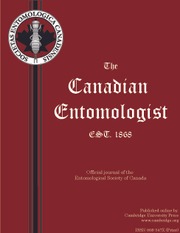Crossref Citations
This article has been cited by the following publications. This list is generated based on data provided by Crossref.
Grobler, Johan H.
1962.
The Life History and Ecology of the Woolly Pine Needle Aphid, Schizolachnus pini-radiatae (Davidson) (Homoptera: Aphididae).
The Canadian Entomologist,
Vol. 94,
Issue. 1,
p.
35.
Lowe, A. D.
1963.
The fungusEntomophthora aphidisHoffman parasitic on the cabbage aphid (Brevicoryne brassicaeL.) in New Zealand.
New Zealand Journal of Agricultural Research,
Vol. 6,
Issue. 3-4,
p.
314.
MACLEOD, DONALD M.
1963.
Insect Pathology.
p.
189.
Angus, T. A.
1964.
Canadian Participation in Insect Pathology.
The Canadian Entomologist,
Vol. 96,
Issue. 1-2,
p.
231.
Ege, Oguz
1965.
Ein Beitrag zur Biologie einiger aphidivorer Entomophthoraceen.
Archiv f�r Mikrobiologie,
Vol. 52,
Issue. 1,
p.
20.
Yendol, William G.
1968.
Factors affecting germination of Entomophthora conidia.
Journal of Invertebrate Pathology,
Vol. 10,
Issue. 1,
p.
116.
MacLeod, Donald M.
and
Müller-Kögler, Erwin
1970.
Insect Pathogens: Species Originally Described from their Resting Spores Mostly as Tarichium Species (Entomophthorales: Entomophthoraceae).
Mycologia,
Vol. 62,
Issue. 1,
p.
33.
WILDING, N.
and
PERRY, J. N.
1980.
Studies on Entomophthora in populations of Aphis fabae on field beans.
Annals of Applied Biology,
Vol. 94,
Issue. 3,
p.
367.
Ben-Ze'ev, I.S.
Bitton, S.
and
Kenneth, R.G.
1990.
Induction and inhibition of germination in Neozygites fresenii (Entomophthorales: Neozygitaceae) zygospores by various time-temperature stimuli.
Journal of Invertebrate Pathology,
Vol. 55,
Issue. 1,
p.
1.
Barta, Marek
and
Cagáň, L’udovít
2006.
Aphid-pathogenic Entomophthorales (their taxonomy, biology and ecology).
Biologia,
Vol. 61,
Issue. S21,
p.
S543.


